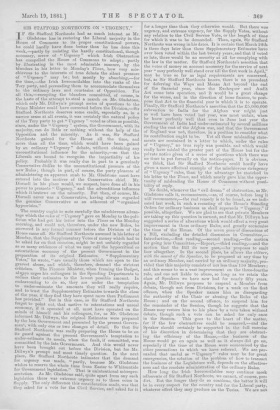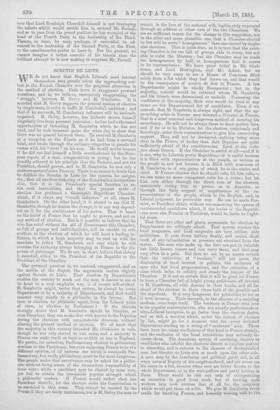SIR STAFFORD NORTHCOTE ON " URGENCY."
IF Sir Stafford Northcote had as much interest as Mr. Gladstone has in restoring the Liberal majority in the House of Commons to its proper constitutional powers, he could hardly have done better than he has done this week,—partly by resisting the hardly constitutional, though necessary, screw of " Urgency " which Irish Obstruction has compelled the House of Commons to adopt ; partly by illustrating in the most admirable manner, by the blunders in his letter to Monday's Times, how very mis- chievous to the interests of true debate the silent pressure of " Urgency " may be ; but mostly by absorbing,—for the time,—the Irish Irreconcilables into the ranks of the Tory party, and persuading them to accommodate themselves to the ordinary laws and courtesies of Opposition. For all this,—excepting the blunders committed, of course, in the haste of the attempt to steal a march on Mr. Gladstone, which only Mr. Dillwyn's prompt series of questions to the Prime Minister could have corrected before the Division,—Sir Stafford Northcote deserves some credit, especially as, in a narrow sense at all events, it was certainly the natural policy of the Tory party to get " Urgency " voted as often as possible, since, under the " Urgency " system, the Government, with its majority, can do little or nothing without the help of the Opposition and the minority. As it was, Sir Stafford Nortlicote gained for the House all the time, and more than all the time, which would have been gained by an ordinary "Urgency" debate, without obtaining any unconstitutional influence for the minority,—so that the Liberals are bound to recognise the impartiality of his policy. Probably it was really due in part to a genuinely Conservative dislike to the unconstitutional pressure of the new Rules ; though in part, of course, the party pleasure of administering an apparent snub to Mr. Gladstone must have entered into the motives of the Conservative chief. Mr. Disraeli in his place would, we suspect, have done all in his power to promote " Urgency," and the adventitious influence which it bestows on the minority. But then, of course, Mr. Disraeli never was a Conservative, having always regarded the genuine Conservative as an adherent of "organised hypocrisies."
The country ought to note carefully the mischievous advan- tage which the rules of "Urgency" gave on Monday to the poli- tician who had got his letter into the Times on the Monday morning, and could not, therefore, under the new Rules, be answered in any formal manner before the Division of the House came off. Sir Stafford Northcote assumed in his letter of Monday, that the Supplementary Votes of money which had to bo asked for on that occasion, might be not unfairly regarded as so many evidences of what we may call the hypocritical or ostentatious economy of the present Government in the preparation of its original Estimates. " Supplementary Votes," he wrote, "are usually those which are open to the gravest abuse, and which, therefore, demand the strictest criticism. The Finance Minister, when framing the Budget, alwjiys urges his colleagues in the Spending Departments to reduce their estimates to the lowest possible amount. In endeavouring to do so, they are under the temptation to under-estimate the amounts they will really require, and to trust the Supplementary Estimates towards the close of the year, if they find they have spent more than Parliament has provided," But in this case, as Sir Stafford Northcote forgot to point out, that motive to ostentatious and unreal economy, if it operated at all, must have operated on the minds of himself and his colleagues, for, as Mr. Gladstone informed Mr. Dillwyn, the original Estimatea were prepared by the late Government and presented by the present Govern- ment, with only one or two changes of detail. So that Sir Stafford Northcoto was really preparing the House to be on its guard against the present Government's temptation to under-estimate its needs, when the fault, if committed, was committed by the late Government. And this would never have been brought out before the Division, but for Mr. Dillwyn's prompt and most timely question. In the next place, Sir Stafford Northcote intimates that the demand for urgency was made, " partly, because Mr. Gladstone wishes to reserve the whole time from Easter to Whitsuntide for Government legislation." That is unintentional misrepre- sentation. As Mr. Gladstone said, quite apart from any such legislation there was extreme urgency as to these votes in Supply. The only difference this consideration made, was that they asked for a vote for the Civil Service, and asked for it for a longer time than they otherwise would. But there was urgency, and extreme urgency, for the Supply Votes, without any relation to the Civil Service Vote, or the length of time for which it was to bo demanded. Then, again, Sir Stafford Northcote was wrong in his dates. It is certain that March 24th is three days later than these Supplementary Estimates have ever been voted within the last twenty years, and that if voted so late, there would be no security at all for complying with the law in the matter. Sir Stafford Northcote's assertion that the votes of money on account necessary for the service of next year " may perfectly well stand over till the first week in April," may be true so far as legal requirements are concerned, but, as Sir Stafford Northcote knows, there is no precedent for deferring the Ways and Means Act beyond the end of the financial year, since the Exchequer and Audit Act came into operation, and it would be a great change for the worse, and in the direction of loose finance, to post- pone that Act to the financial year in which it is to operate.
Finally, Sir Stafford Northcote's assertion that the £5,000,000 subvention to India for the Afghan war might just as well have been voted last year, was most unfair, when he knew perfectly well that even in June last year the Government of India had under-estimated by several millions sterling the cost of the Afghan war, and that the Government of England was not, therefore, in a position to consider what its contribution ought to be. Yet all these misleading state- ments are contained in a letter to which, under the rules. of " Urgency," no true reply was possible, and which would' really have misled the greater part of the House but for the- private notice given of a series of questions which there was no time to put formally on the notice-paper. It is obvious, we think, that Sir Stafford Northcote could hardly have given a more effectual example of the mischievous stringency of " Urgency " rules, than by the advantage lie snatched in his letter to the Times, and which nearly gave him the oppor- tunity of misleading the House of Commons without possi- bility of reply.
No doubt, whenever the "evil dream" of obstruction, as Mr. Gladstone calls it, recommences,—as, of course, before long it will recommence,—the real remedy is to be found, as we indi- cated last week, in such a recasting of the IIouse's Standing Orders for ordinary business as shall supersede " Urgency," if' possible, altogether. We are glad to see that private Members are taking up this question in earnest, and that Mr. Dillwyn has suggested a series of alterations which would effect a very great improvement in these ordinary Rules, and greatly economise the time of the House. Of the seven general discussions of a Bill, excluding the detailed discussion in Committee,— Introduction,—first reading,—second reading,—the motion for going into Committee,—Report,—third reading,—and the motion that the Bill do now pass,—he proposes to omit four altogether. In the second place, he allows the cloture, with the assent of the Speaker, to be proposed at any time by an ordinary Member, and carried by an ordinary majority, pro- vided that this majority consists of not less than 150 Members ; and this seems to us a vast improvement on the three-fourths rule, and one not liable to abuse, so long as we retain the class of Speakers we have now had for nearly fifty years. Again, Mr. Dillwyn proposes to suspend a Member from debate, though not from Divisions, for a week on the first offence, when the Speaker names him as disregarding the authority of the Chair or abusing the Rules of the House ; and on the second offence, to suspend him for the remainder of the Session, though he suggests that the House may restore him to his place by a vote taken without debate, though such a vote can be asked for only once in the Session. This goes to the heart of the matter, for if the few obstructives could be removed,—and the Speaker should certainly be supported in the full exercise of his discretion in determining that they are obstruct- ing the efficiency of the House,—the business of the House would go on again as well as it always did go on, especially if the time of the House were economised by the other precautions to which we have referred, We are per- suaded that useful as " Urgency" rules may be for great emergencies, the solution of the problem of how to transact the business of the Legislature well, depends on the effective- ness and the resolute administration of the ordinary Rules.
IIow long the Irish Irreconcilables may continue meek adherents of Sir Stafford Northcote, we cannot, of course, pre- dict. But the longer they do so continue, the better it will be in every respect for the country and for the Liberal party, whatever effect they may produce on the Tories. We are not sure that Lord Randolph Churchill himself is not developing the talents which would enable him to succeed Mr. Parnell, and so to pass from the proud position he has occupied at the head of the Fourth Party to the leadership of the Third. Thence, in time, he may, perhaps, if successful, be ad- vanced to the leadership of the Second Party, or the First, as the constituencies prefer to have it. For the present, we cannot imagine a better exercise of his talents than the brilliant attempt he is now making to supplant Mr. Parnell.



































 Previous page
Previous page